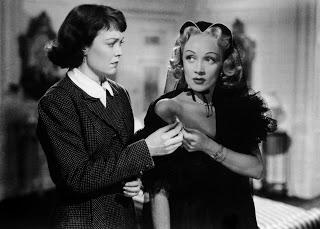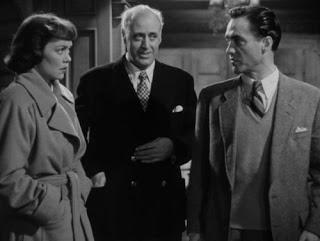
"If there's one thing I cannot bear, it's insincerity."
Critics typically rank Stage Fright (1950) among Alfred Hitchcock's lesser works. It's amusing light entertainment with a clever premise, though ragged in presentation.Jonathan Cooper (Richard Todd) asks his girlfriend Eve (Jane Wyman) to cover up a slight case of murder. Cooper's paramour, singer Charlotte Inwood (Marlene Dietrich), murdered her husband and Cooper's efforts to help incriminate him instead. Eve, an aspiring actress, determines to prove Charlotte's guilt by masquerading as a dresser. The situation grows compounded when she falls for Police Inspector Smith (Michael Wilding) and discovers Jonathan's hiding something.
From its opening with a curtain rising on London, Stage Fright plays with issues of identity. The protagonist are actors, with Eve especially testing her RADA training as ingénue, amateur sleuth and working-class maid. Her cozying up to Inspector Smith backfires when they become romantically involved. Her estranged parents (Alastair Sim and Sybil Thorndike) play-act to protect Eve. Only Jonathan's a poor performer, his erratic behavior undermining his innocence.
Hitchcock returns to comfortable ground after the gimmick-driven Rope and Under Capricorn. He integrates shower moments into the narrative, like a seamless long-take during Jonathan's flashback or the car smashing into the camera. The central set piece is a rain-swept garden party, highlighted by touches strange and comical: the seas of umbrellas, Eve's father haggling with an obnoxious barker (Joyce Grenfell), a bloodstained doll used to torment Charlotte.

The cast is erratic. Jane Wyman gives a strong performance, selling Eve's predicament and vulnerability even as she's thrown into situations from a bad sitcom. The male leads aren't so lucky: Michael Wilding, wooden in Under Capricorn, isn't any more appealing here, while Richard Todd badly overacts, ruining his climactic revelation. Fortunately, character talent like Alastair Sim's hangdog Commodore and Kay Walsh's Cockney maid ballast Stage Fright's weaker scenes.
Marlene Dietrich's a bigger problem. She resisted Hitchcock's direction and subsequently hijacks the movie with every appearance. She's tart and smoldering as always, performing an amusing song, "The Laziest Gal in Town." But Dietrich inhabits an entirely different movie from everyone else, shot in chiaroscuro and fussing over her Dior dresses, as if reliving her Josef Von Sternberg days. Billy Wilder better integrated Dietrich's persona into Witness for the Prosecution.
Dietrich or not, Stage Fright's too flawed to be a classic. It belongs alongside other Hitchcock trifles like To Catch a Thief, enjoyable if not artistic, fun if not entirely satisfying.

